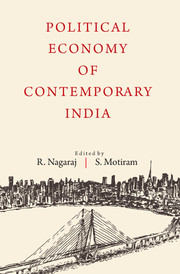Book contents
- Frontmatter
- Contents
- List of Tables and Maps
- List of Figures and Pictures
- Preface
- 1 Introduction: From ‘Intermediate Regime’ to Crony Capitalism
- Economy-wide Considerations
- Political Economy by Regions of India
- 4 Political Economy of a Dominant Caste
- 5 Populism and Party: Society Developmental Regimes in Tamil Nadu and West Bengal
- 6 India's Agricultural Development: A Regional Perspective
- Urban Labour Markets
- Land and Rural Labour
- About the Contributors
- Index
5 - Populism and Party: Society Developmental Regimes in Tamil Nadu and West Bengal
from Political Economy by Regions of India
Published online by Cambridge University Press: 08 February 2018
- Frontmatter
- Contents
- List of Tables and Maps
- List of Figures and Pictures
- Preface
- 1 Introduction: From ‘Intermediate Regime’ to Crony Capitalism
- Economy-wide Considerations
- Political Economy by Regions of India
- 4 Political Economy of a Dominant Caste
- 5 Populism and Party: Society Developmental Regimes in Tamil Nadu and West Bengal
- 6 India's Agricultural Development: A Regional Perspective
- Urban Labour Markets
- Land and Rural Labour
- About the Contributors
- Index
Summary
Introduction
It is increasingly recognised that the nature of political mobilization of classes and castes produces specific political regimes; and these regimes, in turn, set the path of policy regimes and developmental outcomes (Kohli, 1987). Owing to specific regional histories and politics, there are variations in such political regimes. According to John Harriss (1999), Kerala, Tamil Nadu, and West Bengal are states with political regimes dominated by lower castes and classes – albeit in different ways. Pranab Bardhan contrasts ‘welfare regimes’ in West Bengal and Tamil Nadu and attributes the differences between the two to the divergent nature of regional social movements. He argues that regional capital in Tamil Nadu is more indigenised and it has a ‘culture of wealth creation as opposed to redistribution’ (Tillin, 2013).
Tamil Nadu is home to anti-caste movements and political mobilisation of OBCs and SCs for over a century (Arooran, 1980; Chandrababu, 1993; Pandian, 2006). The DMK came to power in 1967, with a broad social base among the lower castes and classes, had a huge inf luence on the policy regime in the state. West Bengalwas ruled by the Left Front Government headed by the Communist Party of India – Marxist (CPM) since 1977 till 2011. The left coalition had an uninterrupted electoral triumph for more than three decades. The state has been credited to have a distinguished record of implementing agrarian reforms in rural Bengal (Bandyapadhyay, 2008; Mishra, 2007).
This paper uses two distinct categories to understand the political milieu and policy regimes Tamil Nadu and West Bengal – populism and partysociety respectively. Contrary to common understanding, populism need not be negative but can have positive connotation for the socially and economically disadvantaged sections. Andrew Wyatt (2013), in the specific context of Tamil Nadu, defines populism as ‘an ideological construct that celebrates the importance of the ordinary people, asserts these people should not be divided by social hierarchy and justifies improvements in their welfare.’ Bardhan argues that populism has indeed produced positive results in Tamil Nadu by taking economic growth and social welfare together (Bardhan, 2014).
- Type
- Chapter
- Information
- Political Economy of Contemporary India , pp. 98 - 124Publisher: Cambridge University PressPrint publication year: 2016

